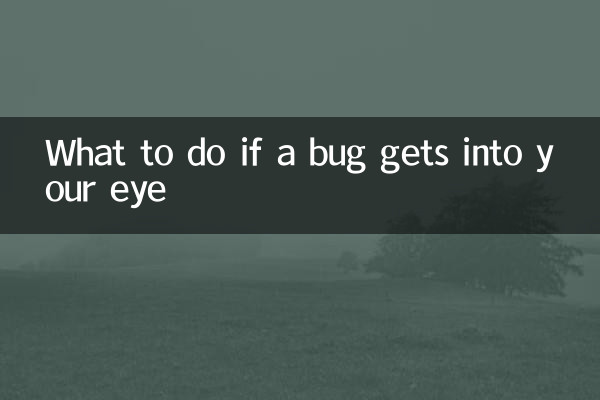What to do if a bug gets into your eye
In daily life, it is common for small bugs to accidentally get into the eyes, especially in summer or during outdoor activities. In this situation, many people will panic and even rub their eyes with their hands, but this may cause more serious injuries. This article will provide you with detailed handling methods and precautions to help you solve the problem quickly and safely.
1. Common symptoms of small bugs in the eyes

When tiny bugs get into the eye, the following symptoms usually appear:
| Symptoms | Description |
|---|---|
| Foreign body sensation | An obvious foreign body sensation in the eye, which may be accompanied by stinging or itching |
| shed tears | Eyes will shed tears involuntarily in an attempt to flush out foreign objects |
| Redness and swelling | There may be redness and swelling of the eyelids or conjunctiva |
| blurred vision | If the bugs lodge in the cornea, they may cause temporary blurred vision |
2. Correct handling steps
Here’s what to do if you get a bug in your eye:
| steps | Operating Instructions |
|---|---|
| 1. Keep calm | Do not rub your eyes to avoid crushing the bugs or scratching the cornea |
| 2. Rinse eyes | Rinse your eyes with clean water or saline, opening your eyelids while flushing |
| 3. Check your eyes | Have someone check your eyelids to see if there are any remaining bugs or debris |
| 4. Use cotton swabs | If the bug is attached to the inside of the eyelid, use a moist cotton swab to gently remove it. |
| 5. Seek medical treatment | If you cannot remove it by yourself or your symptoms worsen, seek medical attention immediately. |
3. Mistakes to avoid
Many people will adopt some wrong ways to deal with this situation, which may aggravate the injury:
| Wrong approach | risk |
|---|---|
| Rub your eyes vigorously | May cause scratches on the cornea or crush the bug into the eye |
| Use sharp objects | Toothpicks, tweezers, etc. may hurt the eyeballs |
| Self-medication | Improper use of eye drops may worsen irritation |
| delay processing | May lead to infection or more serious complications |
4. Preventive measures
To avoid getting bugs into your eyes, you can take the following precautions:
| prevention methods | Description |
|---|---|
| Wear protective glasses | Wear protective glasses when doing outdoor activities or riding |
| Keep the environment clean | Clean your home regularly for mosquitoes to reduce the number of small bugs |
| Pay attention to the wind direction | Protect your eyes in windy conditions |
| Close the window promptly | Close doors and windows promptly at night or when there are many mosquitoes |
5. When Do You Need Medical Treatment?
In the following situations, it is recommended to seek medical treatment immediately:
| situation | Description |
|---|---|
| persistent pain | Still feeling severe pain for more than 30 minutes after treatment |
| decreased vision | Obvious blurred vision or visual field loss occurs |
| increased secretions | A lot of yellow or green discharge from the eyes |
| Unable to remove foreign body | Even after self-treatment, you still feel like there is a foreign body in your eye |
6. Frequently Asked Questions
Here are answers to frequently asked questions about bugs getting into your eyes:
| question | Answer |
|---|---|
| Will bugs come out on their own if they get into your eyes? | In most cases, the eye's self-protection mechanism will allow the bugs to pass out with the tears, but sometimes artificial help is needed |
| Can I rinse my eyes with tap water? | Yes, but it is best to use saline or artificial tears. Tap water may contain microorganisms. |
| What happens if bugs remain in the eyes? | May cause infection, inflammation or corneal damage and should be treated promptly |
| What should I do if bugs get into children’s eyes? | The handling principles are the same, but they need to be more gentle. It is recommended that adults assist in handling. |
7. Summary
Although it is common to get small bugs in your eyes, if not treated properly, it can have serious consequences. When encountering this situation, the most important thing is to stay calm, avoid rubbing your eyes, and follow the correct steps. If it does not resolve on its own or symptoms persist, seek medical attention promptly. You should also pay attention to prevention in daily life to reduce the risk of eye injury.
Remember: the eyes are one of the most delicate organs of the human body, and any eye discomfort should be taken seriously. Only by mastering the correct treatment methods can we protect our visual health when accidents occur.

check the details

check the details